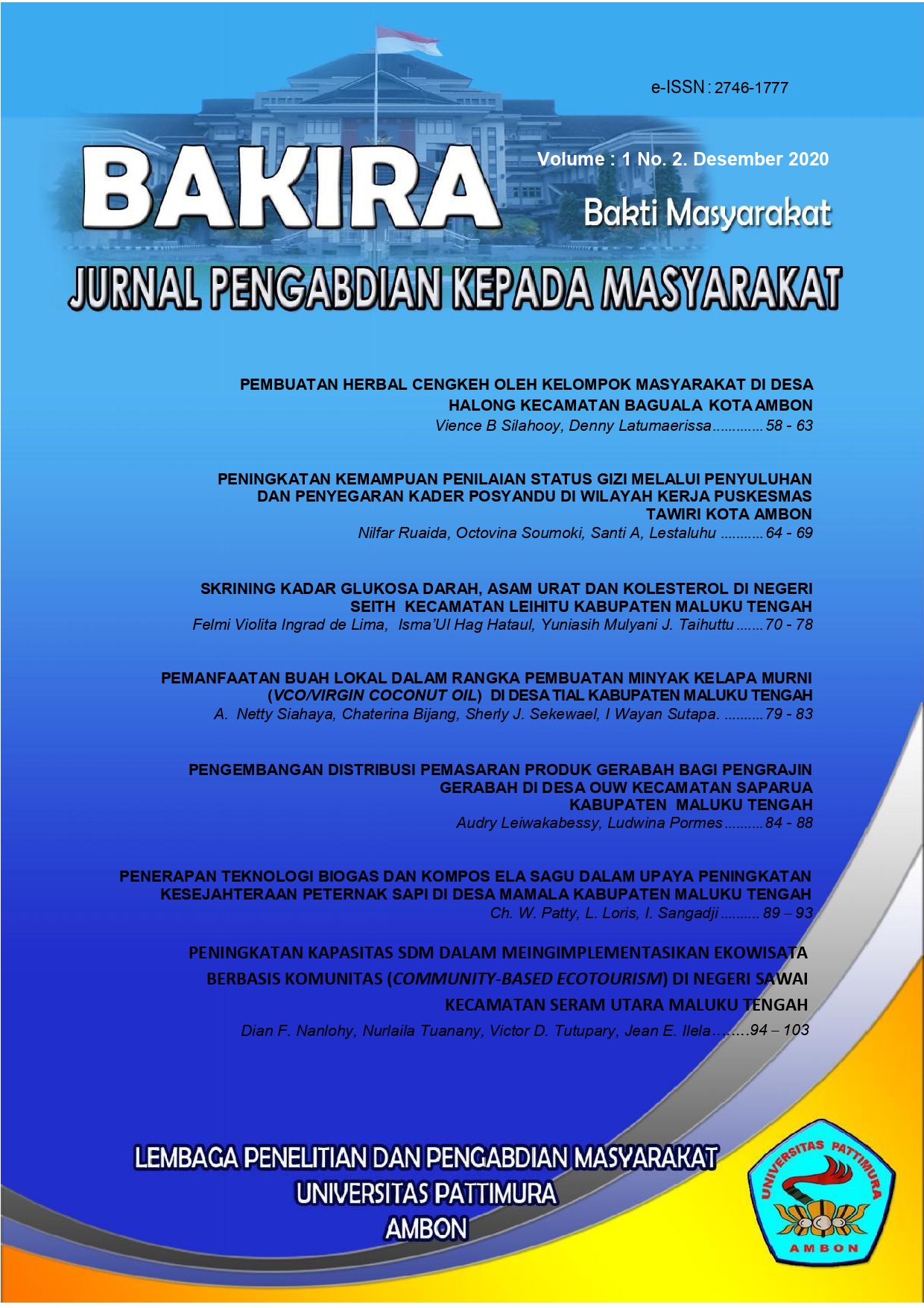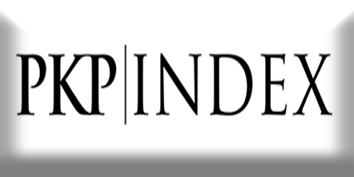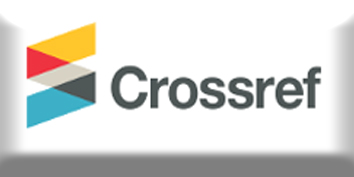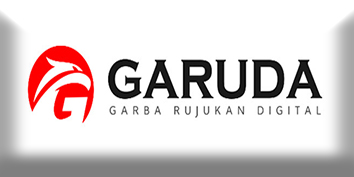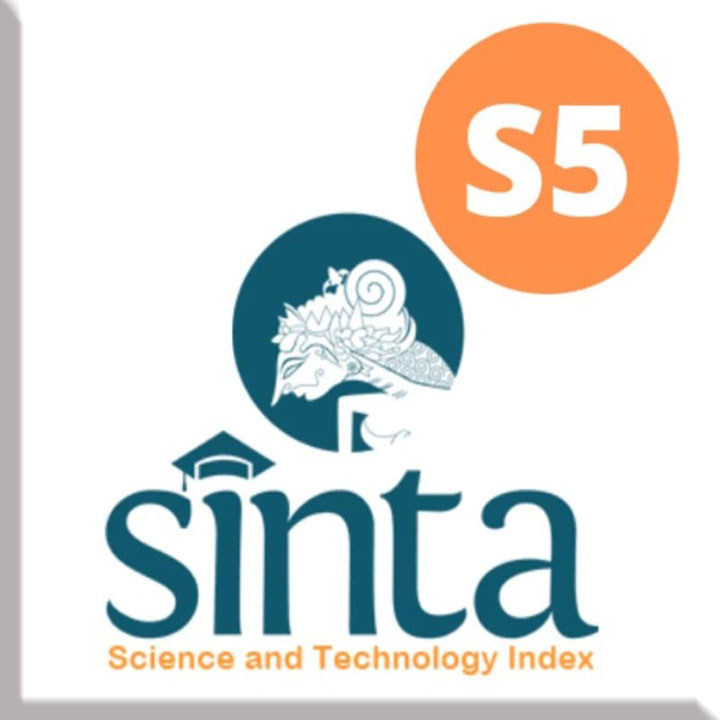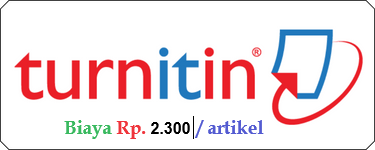PEMBUATAN HERBAL CENGKEH OLEH KELOMPOK MASYARAKAT DI DESA HALONG, KECAMATAN BAGUALA KOTA AMBON
Abstract
Clove leaves are a local Maluku plant that can increase the work of lymphocytes which function to protect the body from antigen attacks that can damage the body. Clove leaf extract has the potential to increase macrophage activity. Macrophages are one of the cells that play an important role in the immune response of living things so that the body will be able to withstand attacks from outside which can interfere with bodily functions. Community service is carried out to foster and train community groups in processing clove leaves into a salable herbal tea. The goal is to improve consumer health and support the economic needs of partners. So that economic and social problems that often arise in the social life of community service partner groups can be eliminated. The results obtained are that several economic and social problems from partners can be resolved, including the availability of equipment that can support production activities. In addition, partners who do not have a job indirectly have the opportunity to open employment opportunities which of course can bring benefits, and partner members' habit of consuming alcohol is also slowly decreasing.
Downloads
References
Abednego, B. (2013). Ensiklopedia Jus Buah dan Sayur untuk Penyembuhan (Kedua). Indonesia Publishing House.
Dewi, Y. K., & Riyandari, B. A. (2020). Potensi Tanaman Lokal sebagai Tanaman Obat dalam Menghambat Penyebaran COVID-19. Jurnal Pharmascience, 7(2), 112–128.
Jonnadi, A., Amar, S., & Aimon, H. (2012). Analisis pertumbuhan ekonomi dan kemiskinan di indonesia. Jurnal Kajian Ekonomi, 1(1).
Kumala, S., & Indriani, D. (2008). Efek antibakteri ekstrak etanol daun cengkeh (Eugenia aromatic L.). Jurnal Farmasi Indonesia, 4(2), 82–87.
Li, X., Geng, M., Peng, Y., Meng, L., & Lu, S. (2020). Molecular immune pathogenesis and diagnosis of COVID-19. Journal of Pharmaceutical Analysis.
Lumingkewas, M., Manarisip, J., Indriaty, F., Walangitan, A., Mandei, J., & Suryanto, E. (2019). Aktivitas antifotooksidan dan komposisi fenolik dari daun cengkeh (Eugenia aromatic L.). Chemistry Progress, 7(2).
Pratama, Y. C. (2014). Analisis faktor-faktor yang mempengaruhi kemiskinan di Indonesia. Esensi: Jurnal Bisnis Dan Manajemen, 4(2).
Radji, M. (2012). Vaksin DNA: Vaksin generasi keempat. Pharmaceutical Sciences and Research (PSR), 6(1), 28–37.
Rorong, J. (2019). Uji aktivitas antioksidan dari daun cengkeh (Eugenia carryophyllus) dengan metode DPPH. Chemistry Progress, 1(2).
Runtunuwu, S. D., Mamarimbing, R., Tumewu, P., & Sondakh, T. (2011). Konsentrasi paclobutrazol dan pertumbuhan tinggi bibit cengkeh (Syzygium aromaticum (L.) Merryl & Perry). Eugenia, 17(2).
Soetrisno, E. (2016). Manajemen sumber daya manusia (Pertama). Kencana.
Suardana, I. B. K., Dewi, N., & Mahardika, I. (2009). Respon Imun Itik Bali Terhadap Berbagai Dosis Vaksin Avian Influenza H5N1. Jurnal Veteriner, 10(3), 150–155.
Subagyo, A., & Purwanto, E. N. (2017). Prinsip-prinsip Keuangan Wirausaha (Pertama). Mitra Wacana Media.
Syawie, M. (2011). Kemiskinan dan kesenjangan sosial. Sosio Informa, 16(3).
Wael, S., Mahulette, F., Watuguly, T. W., & Wahyudi, D. (2018). Pengaruh ekstrak daun cengkeh (Syzygium aromaticum) terhadap limfosit dan makrofag mencit balb/c. Tradit Med J, 23(2), 79–83.

